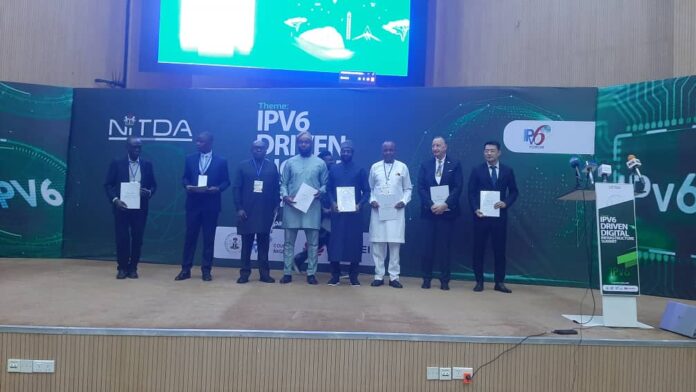By Blessing Otobong-Gabriel
The Federal Government of Nigeria is to deploy and implement the latest Internet Protocol Version (IPV6), in Nigeria to enable the country identify and number internet users and devices and also track internet transactions within the nation’s internet space.
The Minister of Communications Innovation and Digital Economy Dr Bosun Tijani stated this at a one day IPV6-Driven Digital Infrastructure Summit organised by the National Information Technology Development Agency (NITDA), on Tuesday in Abuja
The Minister said this latest IPV6 version will enable authorities to identify online transaction users and small and medium-scale enterprises can benefit from this innovation without needing to worry about the technical details, as it’s the government’s responsibility to ensure a secure internet space.
Speaking further he said, “this is the standard used globally, but only a few countries are on the latest version. Countries like the US, France, Saudi Arabia, and UAE are on IPv6. Most countries are still catching up. Nigeria is now one of the first countries in Africa to migrate from IPv4 to IPv6, which means your providers can offer better services, ensure their systems are not easily hackable, and make sure the services they provide are always available by identifying where the traffic is coming from.
These are the technicalities of how systems get hacked. This is a fantastic move by NITDA and all the partners to ensure Nigeria is multiple steps ahead.
“Migrating from IPv4 to IPv6 requires significant investment, but fortunately, most modern devices are already IPv6 compatible.
Speaking on the impact the IPV6 will have on cybersecurity he said, “You can’t really do cybersecurity if you can’t track the traffic and identify the sources. Cybersecurity often involves people hiding in certain places to attack the system, but IPv6 improves the country’s capability to track traffic and ensure our citizens are safe.”
Speaking, the Director General NITDA, Kachifu Abdullahi, said the summit focuses on the transformative power of IPv6 and its role in Nigeria’s digital economy and development goals under the Agenda 2050 vision
The DG noted that Nigeria is well-positioned to harness the digital economy’s potential given its large young and tech-savvy population. Increased broadband penetration and expanding digital infrastructure support this transformation.
He explained, “IPv6 addresses limitations of IPv4 by providing an expanded address space for the growing number of connected devices. It enhances network performance, security, and enables emerging technologies like IoT, AI, and blockchain.
He said, “the investment needed to implement the IPV6 won’t be much, “It doesn’t require a huge amount because most of our devices today are IPv6 compatible. The compatibility is there, but what’s lacking is the backward compatibility. For example, if you have an IPv4 device, you cannot access an IPv6 device. But most new devices are already IPv6 compatible, so what we need is strategy and policy direction because sometimes operators don’t like migrating since it requires them to change a lot of configurations.”
President Internet Protocol Version 6 (IPV6), Forum Latif Ladid said Nigeria is at the forefront when it comes to internet used in Africa and seventh in the world. And for that Nigeria needs to upgrade from IPV4 to IPV6.
He stated, “the minister and the CEO of nitda are absolutely visionaries themselves. And I know them now for quite a while, and they are really going into the right direction to take Nigeria into the next step, which is basically to be the most modern internet with a strong infrastructure in order to cater for not only the 120 million that you have today, but for everyone. So it will be highly inclusive, so that kids will have the same opportunity to anyone in the world. Because education is really fundamental. Without education kids don’t really have a chance. “





